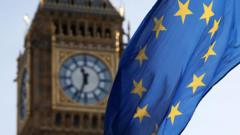In a groundbreaking development for international relations, Britain and the European Union revealed a new agreement on May 19, 2025, fresh off extensive negotiations. This deal not only strengthens security cooperation but also addresses trade dynamics altered by Brexit, offering a strategic retreat from the stricter policies earlier set in motion. British Prime Minister Keir Starmer described the negotiation as a pivotal step in restoring collaboration with the 27-member bloc, especially in the context of a shifting global security landscape.
Britain and EU Forge Historic Security and Trade Agreement

Britain and EU Forge Historic Security and Trade Agreement
In a long-anticipated summit, Britain and the European Union announced a significant deal aimed at enhancing security cooperation and reducing trade barriers post-Brexit.
Nick Thomas-Symonds, a senior British minister involved in the talks, hailed the agreement as a “historic day,” asserting it would boost jobs, alleviate costs, and enhance border security. Addressing critics, he underlined that this partnership aims to reinstate Britain firmly on the global stage, reflecting a government dedicated to serving its citizens.
Despite this positive rhetoric, the deal carries political drama at home, especially regarding the rights of European fishing vessels in British waters, which have been a contentious topic. Reports indicate that the parties agreed to allow European fishermen access until June 30, 2038, a longer timeframe than initially anticipated, which has drawn sharp criticism from pro-Brexit factions within Britain.
The dialogue between the two sides has been framed against a backdrop of international instability and a pressing need for cooperative defense measures, particularly given the recent tensions arising from the war in Ukraine and changes in U.S. foreign policy under President Trump. Additionally, Britain now seeks to involve its defense companies in a substantial €150 billion loan initiative aimed at enhancing mutual defense capabilities.
With high stakes involved, this evolving story promises continued interest as the relationship between Britain and the E.U. is reshaped.
Despite this positive rhetoric, the deal carries political drama at home, especially regarding the rights of European fishing vessels in British waters, which have been a contentious topic. Reports indicate that the parties agreed to allow European fishermen access until June 30, 2038, a longer timeframe than initially anticipated, which has drawn sharp criticism from pro-Brexit factions within Britain.
The dialogue between the two sides has been framed against a backdrop of international instability and a pressing need for cooperative defense measures, particularly given the recent tensions arising from the war in Ukraine and changes in U.S. foreign policy under President Trump. Additionally, Britain now seeks to involve its defense companies in a substantial €150 billion loan initiative aimed at enhancing mutual defense capabilities.
With high stakes involved, this evolving story promises continued interest as the relationship between Britain and the E.U. is reshaped.


















